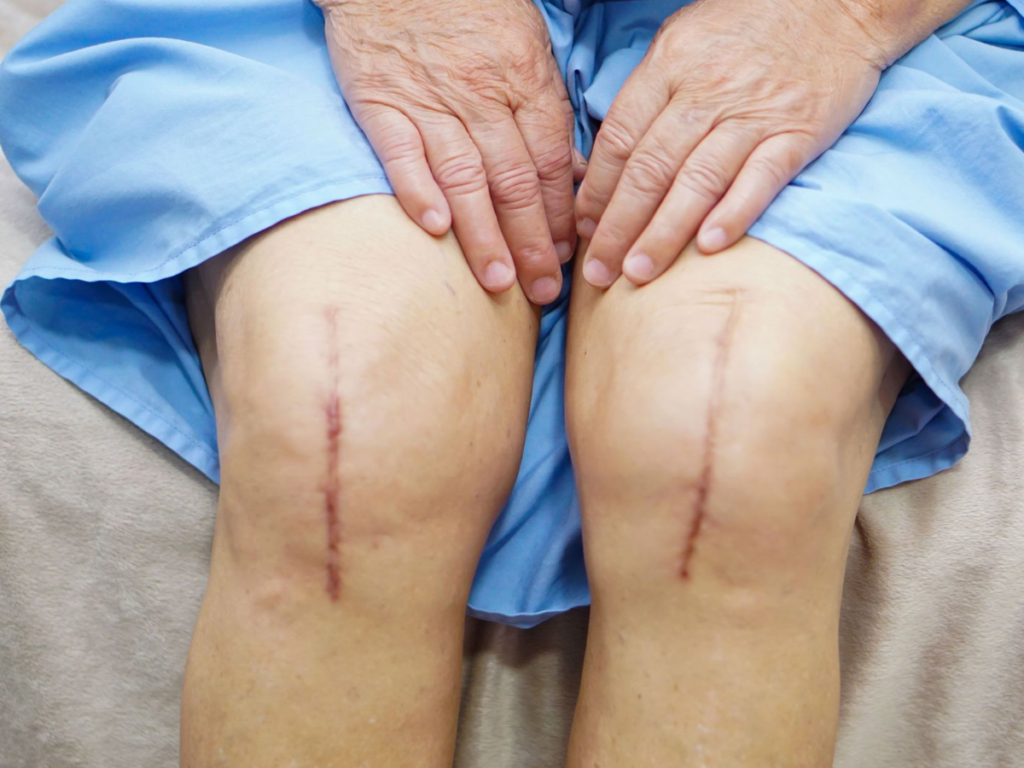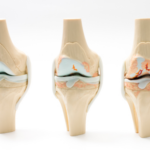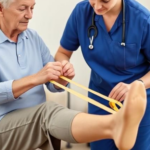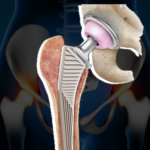
Knee replacement surgery is a transformative procedure that helps individuals regain mobility, reduce chronic pain, and enhance their quality of life. With advancements in techniques, including robotic-assisted surgeries, knee replacement has become safer and more efficient. However, there are possible dangers and consequences, just like with any surgical operation.Fortunately, many of these complications can be avoided by following proper post-surgical care and taking a proactive approach to recovery.
In this blog, we will discuss common complications associated with knee replacement surgery and provide actionable tips to help you minimize the risks, ensuring a smoother recovery.
Common Complications After Knee Replacement Surgery
While knee replacement surgery is generally safe, some potential complications include:
- Infection: Post-operative infections can occur at the incision site or deeper within the joint.
- Blood Clots: Deep vein thrombosis (DVT) is a common concern after surgery, particularly in the legs.
- Stiffness and Reduced Mobility: Some patients may experience difficulty regaining full range of motion.
- Implant Loosening or Failure: Although rare, improper healing or excessive stress can lead to implant instability.
- Nerve or Blood Vessel Damage: In rare cases, surrounding nerves or blood vessels may be injured during surgery.
- Persistent Pain: Some patients may continue to feel pain around the knee joint despite a successful procedure.
Steps to Avoid Complications
Here are detailed strategies to help you avoid complications and ensure a successful recovery:
1. Choose an Experienced Surgeon
Your choice of surgeon significantly impacts the success of your knee replacement. Opt for a specialist like Dr. Saurabh Giri, a leading robotic knee replacement surgeon in Pune, who utilizes advanced technology for precise outcomes. Robotic-assisted surgeries ensure accurate implant positioning, reducing the risk of complications.
2. Follow Pre-Surgery Instructions
Your preparation before surgery is crucial in preventing complications. Follow these steps:
- Quit Smoking: Smoking affects blood circulation and slows the healing process.
- Manage Chronic Conditions: Conditions like diabetes, hypertension, or obesity should be under control before the procedure.
- Discuss Medications: Inform your surgeon about all medications, including blood thinners or supplements, as some may need to be paused.
3. Prevent Infections
Infections can cause more problems and slow down the healing process. Here’s how to reduce the danger:
- Preserve your hygiene: Make sure the surgery site is dry and clean. When changing your dressings, do as your doctor directs.
- Antibiotics: Take prescribed antibiotics as directed to prevent bacterial infections.
- Recognize Early Signs: Look out for redness, swelling, warmth, or discharge at the incision site and report these symptoms immediately.
4. Stay Active but Don’t Overdo It
Movement is essential after knee replacement surgery to prevent stiffness and improve mobility, but overexertion can lead to complications.
- Physical Therapy: Enroll in a structured physical therapy program. Therapists will guide you through exercises to strengthen the knee and restore range of motion.
- Gradual Progression: Avoid high-impact activities or lifting heavy weights until cleared by your doctor.
5. Prevent Blood Clots
Blood clots are one of the most serious complications after knee replacement surgery. To minimize this risk:
- Medication: Take prescribed blood-thinning medications as directed.
- Compression Stockings: Wear compression stockings to improve circulation and prevent clot formation.
- Regular Movement: Avoid prolonged periods of sitting or lying down. Gentle movements such as ankle pumps and short walks help maintain blood flow.
6. Focus on Nutrition and Hydration
Proper nutrition accelerates healing and reduces inflammation.
- Eat Balanced Meals: Include protein-rich foods, leafy greens, and whole grains to support tissue repair.
- Stay Hydrated: Drink plenty of water to avoid dehydration, which can slow recovery.
- Avoid Alcohol: Alcohol can interfere with medications and impair healing.
7. Manage Pain Effectively
Pain management is vital for a smooth recovery. Uncontrolled pain can hinder rehabilitation progress.
- Medications: Take prescribed pain relievers as directed by your surgeon.
- Ice Packs: Use ice packs to reduce swelling and numb discomfort around the knee.
- Alternative Therapies: Techniques such as meditation, deep breathing, or acupuncture can complement traditional pain management methods.
8. Avoid Falls and Injuries
Falls can damage your new joint and delay recovery. Take these precautions:
- Use Assistive Devices: Walkers or crutches provide support during the initial recovery phase.
- Modify Your Home: Remove tripping hazards like loose rugs and ensure adequate lighting.
- Wear Supportive Footwear: Choose flat, non-slip shoes to improve stability.
9. Attend Follow-Up Appointments
Regular follow-up visits with your surgeon are critical to monitor your progress. During these visits:
- Get X-rays: Ensure the implant is properly positioned and healing as expected.
- Discuss Concerns: Inform your doctor about any unusual symptoms, such as pain, swelling, or fever.
10. Stay Positive and Patient
Recovery from knee replacement surgery takes time, and setbacks can occur. Maintaining a positive outlook and staying patient are key to long-term success. Celebrate small milestones and trust the process.
When to Seek Medical Help
Contact your surgeon immediately if you experience:
• Excruciating pain that doesn’t go away when taking medicine.
• Infection symptoms, like chills, fever, or redness near the wound.
• Prolonged numbness or swelling.
• Having trouble bearing weight or moving the knee.
Conclusion
Knee replacement surgery can transform your life, helping you regain mobility and enjoy an active lifestyle. However, preventing complications requires a combination of diligent post-surgical care, lifestyle adjustments, and professional guidance. By choosing an experienced surgeon like Dr. Saurabh Giri at Helios Orthojoint Clinic and following these tips, you can minimize risks and maximize the benefits of your surgery. Remember, your recovery is a partnership between you and your healthcare team. Stay proactive, adhere to your doctor’s advice, and look forward to a pain-free future.




